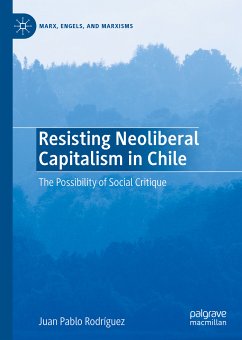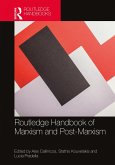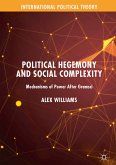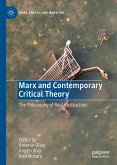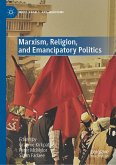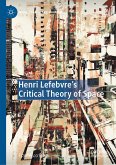This book explores the relationship between recent theoretical debates around the fate of critique of neoliberal capitalism and critical theory, on the one hand, and the critical theories generated in and by social movements in Chile, on the other. By taking the idea of social critique as a field that encompasses both critical social theories and the practices of social criticism carried out by social movements, Resisting Neoliberal Capitalism in Chile explore how the student and the Pobladores movements map, resist and contest neoliberal capitalism in commodified areas such as education and housing in Chile, one of the first 'neoliberal experiments' in Latin America and the world.
Juan Pablo Rodríguez received an M.A in Social and Political Thought from the University of Birmingham (2010) and a PhD in Sociology from the University of Bristol (2018). He has worked as researcher and part-time lecturer in Chilean universities, teaching modules on classic, modern and contemporary sociological theory, political sociology and social movements. Juan Pablo Rodríguez's research interests includes social theory, neo and post Marxism, and social movements, especially contemporary housing, student and socio-environmental movements. He is currently an honorary research associate at the University of Bristol and a visiting postdoctoral research fellow at the Latin American Centre (LAC), University of Oxford.
Dieser Download kann aus rechtlichen Gründen nur mit Rechnungsadresse in A, B, BG, CY, CZ, D, DK, EW, E, FIN, F, GR, HR, H, IRL, I, LT, L, LR, M, NL, PL, P, R, S, SLO, SK ausgeliefert werden.
"Rodriguez adds to this literature by exploring how renewed critiques of capitalism, informed by Marxist thought and produced by social movements, advance our understanding of social conflict and emancipatory politics. The main contribution of Rodriguez's book is his effort to bring neo-Marxist thinking to the analysis of contemporary social movements." (Hector Rios-Jara, Contemporary Political Theory, Vol. 20 (3), September, 2021)
"This ambitious book is a welcome contribution to a sociology of social movements grounded in a reflexive dialogue between critical theory, social movement studies and empirical enquiry ... . it is promising that there are clear signs that researchers are returning to a much-needed sociology of social movements emerging from a reflexive dialogue between critical theories, social movement studies and empirical enquiry." (Malik Fercovic, LSE Review of Books, April 22, 2020)
"This ambitious book is a welcome contribution to a sociology of social movements grounded in a reflexive dialogue between critical theory, social movement studies and empirical enquiry ... . it is promising that there are clear signs that researchers are returning to a much-needed sociology of social movements emerging from a reflexive dialogue between critical theories, social movement studies and empirical enquiry." (Malik Fercovic, LSE Review of Books, April 22, 2020)
Es gelten unsere Allgemeinen Geschäftsbedingungen: www.buecher.de/agb
Impressum
www.buecher.de ist ein Internetauftritt der buecher.de internetstores GmbH
Geschäftsführung: Monica Sawhney | Roland Kölbl | Günter Hilger
Sitz der Gesellschaft: Batheyer Straße 115 - 117, 58099 Hagen
Postanschrift: Bürgermeister-Wegele-Str. 12, 86167 Augsburg
Amtsgericht Hagen HRB 13257
Steuernummer: 321/5800/1497
USt-IdNr: DE450055826
Bitte wählen Sie Ihr Anliegen aus.
Rechnungen
Retourenschein anfordern
Bestellstatus
Storno

